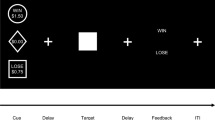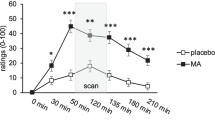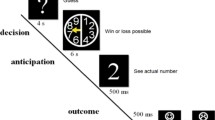Abstract
Introduction
Stimulant drugs are thought to alter processing of rewarding stimuli. However, the mechanisms by which they do this are not fully understood.
Method
In this study we used EEG to assess effects of single doses of methamphetamine (MA) on neural responses during anticipation and receipt of reward in healthy volunteers. Healthy young men and women (N = 28) completed three sessions in which they received placebo, a low MA dose (10 mg) or a higher MA dose (20 mg) under double blind conditions. Subjective and cardiovascular measures were obtained, and EEG was used to assess brain activity during an electrophysiological version of the Monetary Incentive Delay (eMID) task.
Results
EEG measures showed expected patterns during anticipation and receipt of reward, and MA produced its expected effects on mood and cardiovascular function. However, MA did not affect EEG responses during either anticipation or receipt of rewards.
Conclusions
These findings suggest that the effects of MA on EEG signals of reward processing are subtle, and not related to the drug’s effects on subjective feelings of well-being. The findings contribute to our understanding of the neural effects of MA during behaviors related to reward.







Similar content being viewed by others
Data availability
Data is available raw or processed, upon request to the corresponding author.
Notes
Two major issues with results suggest the PCA was not successfully able to separate the RewP from the preceding FB-P2 and subsequent FB-P3. First, although TF4SF1 is consistent with FB-P2, the next adjacent factor, TF5SF1, does not resemble the RewP. For example, TF4SF1 peaks at 176 ms around FCz and shows no difference between Reward Win and Lose conditions, consistent with the FB-P2. But the next adjacent factor, TF5SF1, does not align with RewP effects in ERP waveform, peaks too early (224 ms at FCz), and is greatest for Reward Lose (vs. Win). These results suggest that while TF4SF1 likely reflects the FB-P2, TF5SF1 may not reflect the RewP but rather some combination of overlapping FB-P2 and RewP activity. In support, one recent PCA study reported the RewP PC factor was not significantly modulated by outcome valence (Clayson et al. 2019), suggesting temporospatial PCA may be unable to adequately separate feedback-related ERPs in some cases.
Second, two positive PCs emerged in the FB-P3 time window: TF7SF1 and TF2SF1. Numerous studies have identified two P3-related ERP components: an earlier, frontal P3a reflecting early attention and a later, parietal P3b reflecting stimulus categorization (Polich 2007). One previous reward processing study used PCA to separate the FB-P3 into the FB-P3a and FB-P3b after feedback and produced PC factor distributions strikingly similar to the present results (Glazer et al. 2020). Consistent with this prior study, the current results suggest TF2SF1 corresponds to the FB-P3b. However, unlike this previous study, the current results suggest PCA was unable to successfully separate the RewP from the FB-P3a. While TF7SF1 may reflect the FB-P3a, it rather resembles the RewP in peak latency and electrode (276 ms at Cz), is greatest for Reward Win (vs. Lose), and lines up with expected RewP effects in the ERP waveform. These results suggest it is likely that TF5SF1 and TF7SF1 PC factors contain overlapping activity corresponding to the RewP and FB-P3a, respectively.
Results suggest it is likely that substantial temporal overlap remained after PCA among TF4SF1, TF5SF1, and TF7SF1, presumably reflecting the FB-P2, RewP, and FB-P3a. Further complicating interpretation, one negative PC emerged (TF12SF1) consistent with the peak latency, scalp topography, and polarity of the feedback-related negativity (FRN). While the RewP reflects a positive ERP deflection after better-than-expected feedback, a negative ERP deflection called the FRN may index worse-than-expected feedback in the same time window (Proudfit 2015, Holroyd et al. 2008, 2011). Although most reward processing studies using PCA do not report a negative deflection consistent with the FRN, some previous studies have done so and are consistent with the present results (Valadez et al. 2016, Valadez 2019). The present results suggest temporospatial PCA of feedback-related ERPs may produce more complex PC distributions than previously reported. Future studies should consider comprehensive reporting of all PCs in the FB-P2/RewP/FB-P3 time window to better interpret and understand the rapid cascade of feedback-related ERPs.
References
American Psychiatric Association (2013) Diagnostic and statistical manual of mental disorders, 5th edn. https://doi.org/10.1176/appi.books.9780890425596
Ablin P, Cardoso J-F, Gramfort A (2018) Faster independent component analysis by preconditioning with Hessian approximations. IEEE Trans Signal Process 66:4040–4049
Berridge KC (2007) The debate over dopamine’s role in reward: the case for incentive salience. Psychopharmacology 191:391–431
Berridge CW, Waterhouse BD (2003) The locus coeruleus-noradrenergic system: modulation of behavioral state and state-dependent cognitive processes. Brain Res Brain Res Rev 42(1):33–84. https://doi.org/10.1016/s0165-0173(03)00143-7
Berridge KC, Robinson TE, Aldridge JW (2009) Dissecting components of reward: “liking”, “wanting”, and learning. Curr Opin Pharmacol 9(1):65–73. https://doi.org/10.1016/j.coph.2008.12.014
Bowyer CB, Joyner KJ, Yancey JR, Venables NC, Hajcak G, Patrick CJ (2019) Toward a neurobehavioral trait conceptualization of depression proneness. Psychophysiology 56(7):e13367. https://doi.org/10.1111/psyp.13367
Bradley MM, Sabatinelli D, Lang PJ, Fitzsimmons JR, King W, Desai P (2003) Activation of the visual cortex in motivated attention. Behav Neurosci 117(2):369–380. https://doi.org/10.1037/0735-7044.117.2.369
Bressan RA, Crippa JA (2005) The role of dopamine in reward and pleasure behaviour–review of data from preclinical research. Acta Psychiatr Scand Suppl 427:14–21. https://doi.org/10.1111/j.1600-0447.2005.00540.x
Broyd SJ, Richards HJ, Helps SK, Chronaki G, Bamford S, Sonuga-Barke EJ (2012) An electrophysiological monetary incentive delay (e-MID) task: a way to decompose the different components of neural response to positive and negative monetary reinforcement. J Neurosci Methods 209(1):40–49. https://doi.org/10.1016/j.jneumeth.2012.05.015
Castells X, Blanco-Silvente L, Cunill R (2018) Amphetamines for attention deficit hyperactivity disorder (ADHD) in adults. Cochrane Database Syst Rev 8(8):CD007813. https://doi.org/10.1002/14651858.CD007813.pub3
Cavanagh JF, Olguin SL, Talledo JA, Kotz JE, Roberts BZ, Nungaray JA, Sprock J, Gregg D, Bhakta SG, Light GA, Swerdlow NR, Young JW, Brigman JL (2022) Amphetamine alters an EEG marker of reward processing in humans and mice. Psychopharmacology (Berl) 239(3):923–933. https://doi.org/10.1007/s00213-022-06082-z
Clayson PE, Wynn JK, Infantolino ZP, Hajcak G, Green MF, Horan WP (2019) Reward processing in certain versus uncertain contexts in schizophrenia: An event-related potential (ERP) study. J Abnorm Psychol 128(8):867–880. https://doi.org/10.1037/abn0000469
Crane NA, Gorka SM, Weafer J, Langenecker SA, de Wit H, Phan KL (2018) Neural activation to monetary reward is associated with amphetamine reward sensitivity. Neuropsychopharmacology 43(8):1738–1744. https://doi.org/10.1038/s41386-018-0042-8
Crow SJ (2019) Pharmacologic Treatment of Eating Disorders. Psychiatr Clin North Am 42(2):253–262. https://doi.org/10.1016/j.psc.2019.01.007
Delorme A, Makeig S (2004) EEGLAB: an open source toolbox for analysis of single-trial EEG dynamics including independent component analysis. J Neurosci Methods 134(1):9–21. https://doi.org/10.1016/j.jneumeth.2003.10.009
Di Chiara G, Imperato A (1988) Drugs abused by humans preferentially increase synaptic dopamine concentrations in the mesolimbic system of freely moving rats. Proc Natl Acad Sci USA 85(14):5274–5278. https://doi.org/10.1073/pnas.85.14.5274
Dien J (2010) The ERP PCA Toolkit: an open source program for advanced statistical analysis of event-related potential data. J Neurosci Methods 187(1):138–145. https://doi.org/10.1016/j.jneumeth.2009.12.009
Dien J (2012) Applying principal components analysis to event-related potentials: a tutorial. Dev Neuropsychol 37(6):497–517. https://doi.org/10.1080/87565641.2012.697503
Dien J, Beal DJ, Berg P (2005) Optimizing principal components analysis of event-related potentials: matrix type, factor loading weighting, extraction, and rotations. Clin Neurophysiol 116(8):1808–1825. https://doi.org/10.1016/j.clinph.2004.11.025
Drevets WC, Gautier C, Price JC, Kupfer DJ, Kinahan PE, Grace AA, Price JL, Mathis CA (2001) Amphetamine-induced dopamine release in human ventral striatum correlates with euphoria. Biol Psychiatry 49(2):81–96. https://doi.org/10.1016/s0006-3223(00)01038-6
Faraone SV (2018) The pharmacology of amphetamine and methylphenidate: Relevance to the neurobiology of attention-deficit/hyperactivity disorder and other psychiatric comorbidities. Neurosci Biobehav Rev 87:255–270. https://doi.org/10.1016/j.neubiorev.2018.02.001
Flores A, Münte TF, Doñamayor N (2015) Event-related EEG responses to anticipation and delivery of monetary and social reward. Biol Psychol 109:10–19. https://doi.org/10.1016/j.biopsycho.2015.04.005
Foti D, Hajcak G, Dien J (2009) Differentiating neural responses to emotional pictures: evidence from temporal-spatial PCA. Psychophysiology 46(3):521–530. https://doi.org/10.1111/j.1469-8986.2009.00796.x
Foti D, Weinberg A, Dien J, Hajcak G (2011) Event-related potential activity in the basal ganglia differentiates rewards from nonrewards: temporospatial principal components analysis and source localization of the feedback negativity. Hum Brain Mapp 32(12):2207–16. https://doi.org/10.1002/hbm.21182
Glazer JE, Kelley NJ, Pornpattananangkul N, Mittal VA, Nusslock R (2018) Beyond the FRN: Broadening the time-course of EEG and ERP components implicated in reward processing. Int J Psychophysiol Part B 32:184–202. https://doi.org/10.1016/j.ijpsych
Glazer J, King A, Yoon C, Liberzon I, Kitayama S (2020) DRD4 polymorphisms modulate reward positivity and P3a in a gambling task: Exploring a genetic basis for cultural learning. Psychophysiology 57(10):e13623. https://doi.org/10.1111/psyp.13623
Glazer J, Murray CH, Nusslock R, Lee R, de Wit H (2022) Low doses of lysergic acid diethylamide (LSD) increase reward-related brain activity. Neuropsychopharmacology. https://doi.org/10.1038/s41386-022-01479-y
Haber SN, Knutson B (2010) The reward circuit: linking primate anatomy and human imaging. Neuropsychopharmacology 35(1):4–26. https://doi.org/10.1038/npp.2009.129
Helfrich RF, Knight RT (2019) Cognitive neurophysiology: Event-related potentials. Handb Clin Neurol 160:543–558. https://doi.org/10.1016/B978-0-444-64032-1.00036-9
Holroyd CB, Pakzad-Vaezi KL, Krigolson OE (2008) The feedback correct-related positivity: Sensitivity of the event-related brain potential to unexpected positive feedback. Psychophysiology 45(5):688–697
Holroyd CB, Krigolson OE, Lee S (2011) Reward positivity elicited by predictive cues. NeuroReport 22(5):249–252. https://doi.org/10.1097/WNR.0b013e328345441d
Jauhar S, Fortea L, Solanes A, Albajes-Eizagirre A, McKenna PJ, Radua J (2021) Brain activations associated with anticipation and delivery of monetary reward: a systematic review and meta-analysis of fMRI studies. PLoS One 16(8):e0255292. https://doi.org/10.1371/journal.pone.0255292
Knutson B, Bjork JM, Fong GW, Hommer D, Mattay VS, Weinberger DR (2004) Amphetamine modulates human incentive processing. Neuron 43(2):261–269. https://doi.org/10.1016/j.neuron.2004.06.030
Langenecker SA et al (2020) Anticipation of monetary reward in amygdala, insula, caudate are predictors of pleasure sensitivity to D-amphetamine administration. Drug Alcohol Depend 206:107725. https://doi.org/10.1016/j.drugalcdep.2019.107725
Liu X, Hairston J, Schrier M, Fan J (2011) Common and distinct networks underlying reward valence and processing stages: a meta-analysis of functional neuroimaging studies. Neurosci Biobehav Rev 35(5):1219–36. https://doi.org/10.1016/j.neubiorev.2010.12.012
Maski K, Trotti LM, Kotagal S, Robert Auger R, Swick TJ, Rowley JA, Hashmi SD, Watson NF (2021) Treatment of central disorders of hypersomnolence: an American Academy of Sleep Medicine systematic review, meta-analysis, and GRADE assessment. J Clin Sleep Med 17(9):1895–1945. https://doi.org/10.5664/jcsm.9326
Mattay VS, Callicott JH, Bertolino A, Heaton I, Frank JA, Coppola R, Berman KF, Goldberg TE, Weinberger DR (2000) Effects of dextroamphetamine on cognitive performance and cortical activation. Neuroimage 12(3):268–275. https://doi.org/10.1006/nimg.2000.0610
McIntyre RS, Lee Y, Zhou AJ, Rosenblat JD, Peters EM, Lam RW, Kennedy SH, Rong C, Jerrell JM (2017) The Efficacy of Psychostimulants in Major Depressive Episodes: A Systematic Review and Meta-Analysis. J Clin Psychopharmacol 37(4):412–418. https://doi.org/10.1097/JCP.0000000000000723
Moore KE (1977) The actions of amphetamine on neurotransmitters: a brief review. Biol Psychiatry 12(3):451–462
Morean ME, de Wit H, King AC, Sofuoglu M, Rueger SY, O’Malley SS (2013) The drug effects questionnaire: psychometric support across three drug types. Psychopharmacology (Berl) 227(1):177–92. https://doi.org/10.1007/s00213-012-2954-z
Murray, CH, JE Glazer, R Lee, R Nusslock, H de Wit (2022) THC reduces reward-related brain activity in healthy adults. Psychopharmacology. https://doi.org/10.1007/s00213-022-06164-y
McNair D, Lorr M, Doppleman L (1971) POMS manual for the profile of mood states. Educational and Industrial Testing Service, San Diego
Novak KD, Foti D (2015) Teasing apart the anticipatory and consummatory processing of monetary incentives: An event-related potential study of reward dynamics. Psychophysiology 52(11):1470–1482. https://doi.org/10.1111/psyp.12504
Nusslock R, Alloy LB (2017) Reward processing and mood-related symptoms: An RDoC and translational neuroscience perspective. J Affect Disord 216:3–16. https://doi.org/10.1016/j.jad.2017.02.001
Pfabigan DM, Seidel EM, Sladky R, Hahn A, Paul K, Grahl A, Lamm C (2014) P300 amplitude variation is related to ventral striatum BOLD response during gain and loss anticipation: an EEG and fMRI experiment. NeuroImage 96:12–21
Polich J (2007) Updating P300: an integrative theory of P3a and P3b. Clin Neurophysiol 118(10):2128–2148
Polezzi D, Lotto L, Daum I, Sartori G, Rumiati R (2008) Predicting outcomes of decisions in the brain. Behav Brain Res 187(1):116–122
Pornpattananangkul N, Nusslock R (2015) Motivated to win: Relationship between anticipatory and outcome reward-related neural activity. Brain Cogn 100:21–40
Proudfit GH (2015) The reward positivity: From basic research on reward to a biomarker for depression. Psychophysiology 52:449–459
Sambrook TD, Goslin J (2015) A neural reward prediction error revealed by a meta-analysis of ERPs using great grand averages. Psychol Bull 141(1):213–235. https://doi.org/10.1037/bul0000006
Sambrook TD, Goslin J (2016) Principal components analysis of reward prediction errors in a reinforcement learning task. Neuroimage 124(Pt A):276–286. https://doi.org/10.1016/j.neuroimage.2015.07.032
San Martín R (2012) Event-related potential studies of outcome processing and feedback-guided learning. Front Human Neurosci 6. https://doi.org/10.3389/fnhum.2012.00304
Schultz W (2007) Multiple dopamine functions at different time courses. Annu Rev Neurosci 30:259–288. https://doi.org/10.1146/annurev.neuro.28.061604.135722
Schultz W, Dayan P, Montague PR (1997) A neural substrate of prediction and reward. Science 275:1593–1599
Schutte I, Deschamps PKH, van Harten PN, Kenemans JL (2020) Dopaminergic and noradrenergic manipulation of anticipatory reward and probability event-related potentials. Psychopharmacology (Berl) 237(7):2019–2030. https://doi.org/10.1007/s00213-020-05515-x
Substance Abuse and Mental Health Services Administration (2022) Key substance use and mental health indicators in the United States: Results from the 2021 National Survey on Drug Use and Health (HHS Publication No. PEP22-07-01-005, NSDUH Series H-57). Center for Behavioral Health Statistics and Quality, Substance Abuse and Mental Health Services Administration. https://www.samhsa.gov/data/report/2021-nsduh-annual-national-report
Valadez EA (2019) Electrophysiological indicators of feedback processing related to obsessive-compulsive symptoms [Doctoral dissertation]. University of Delaware. https://udspace.udel.edu/items/f22ca054-c3c6-45c3-9e6c-92765d2e8bb2
Valadez EA, Farrell KN, Infantolino ZP, Roberts K, Simons RF (2016) Principal component analysis of mock-gambling task ERPs revealed negativity specific to nonrewards. Psychophysiology 53(Suppl 1):S71. https://doi.org/10.1111/psyp.12673
Volkow ND, Wang GJ, Fowler JS, Logan J, Gatley SJ, Wong C, Hitzemann R, Pappas NR (1999) Reinforcing effects of psychostimulants in humans are associated with increases in brain dopamine and occupancy of D(2) receptors. J Pharmacol Exp Ther 291(1):409–415
Walsh MM, Anderson JR (2012) Learning from experience: event-related potential correlates of reward processing, neural adaptation, and behavioral choice. Neurosci Biobehav Rev 36(8):1870–84. https://doi.org/10.1016/j.neubiorev.2012.05.008
White TL, Justice AJ, de Wit H (2002) Differential subjective effects of D-amphetamine by gender, hormone levels and menstrual cycle phase. Pharmacol Biochem Behav 73(4):729–741. https://doi.org/10.1016/s0091-3057(02)00818-3
Zack MH, Lobo DS, Biback C, Fang T, Smart K, Tatone D, Kalia A, Digiacomo D, Kennedy JL (2017) Parallel role for the dopamine D1 receptor in gambling and amphetamine reinforcement in healthy volunteers. J Psychopharmacol 31(1):31–42. https://doi.org/10.1177/0269881116665329
Funding
This research was supported by National Institute on Drug Abuse grant DA02812.
Author information
Authors and Affiliations
Contributions
CJH – analysis, interpretation, writing.
JG – analysis, interpretation, writing.
RL – design, interpretation.
RN –analysis, interpretation.
HdW – design, analysis, interpretation, writing.
Corresponding author
Ethics declarations
Competing interests
HdW serves on the Board of Directors of PharmAla Biotech and has served as Scientific Advisor to Awakn Life Sciences, Gilgamesh Pharmaceuticals and Mind Foundation. These roles are unrelated to the research reported here. CJH, JEG, IT, MK, and RL have no conflicts of interest to disclose.
Additional information
Publisher's note
Springer Nature remains neutral with regard to jurisdictional claims in published maps and institutional affiliations.
Supplementary Information
Below is the link to the electronic supplementary material.
Rights and permissions
Springer Nature or its licensor (e.g. a society or other partner) holds exclusive rights to this article under a publishing agreement with the author(s) or other rightsholder(s); author self-archiving of the accepted manuscript version of this article is solely governed by the terms of such publishing agreement and applicable law.
About this article
Cite this article
Haggarty, C.J., Glazer, J.E., Nusslock, R. et al. Lack of effect of methamphetamine on reward-related brain activity in healthy adults. Psychopharmacology 241, 181–193 (2024). https://doi.org/10.1007/s00213-023-06475-8
Received:
Accepted:
Published:
Issue Date:
DOI: https://doi.org/10.1007/s00213-023-06475-8




